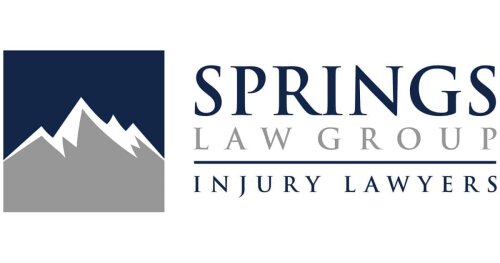Best Toxic Mold Lawyers in Colorado
Share your needs with us, get contacted by law firms.
Free. Takes 2 min.
Or refine your search by selecting a city:
List of the best lawyers in Colorado, United States

About Toxic Mold Law in Colorado, United States
Toxic mold refers to certain types of mold that produce mycotoxins, which can pose health risks to humans and animals. In Colorado, issues with toxic mold most commonly arise in residential and commercial properties due to water damage, insufficient ventilation, or neglect. While there is no specific Colorado state law that solely governs toxic mold, provisions within housing, landlord-tenant, and real estate laws are often invoked in mold-related disputes. Problems resulting from toxic mold exposure can range from property damage to significant health effects, including respiratory problems, allergic reactions, and exacerbated asthma symptoms.
Why You May Need a Lawyer
Many people facing toxic mold issues seek legal counsel for several reasons. Common situations include:
- Difficulty getting a landlord or property management company to address dangerous mold problems
- Health issues or injuries believed to be caused by mold exposure
- Property damage claims, including diminished property value
- Disputes between buyers and sellers of real estate about undisclosed mold issues
- Challenges with insurance claims related to mold damage
- Employment law issues if workplace mold causes injury or illness
Engaging a lawyer experienced in toxic mold cases can help you understand your rights, gather evidence, and navigate the legal process to seek compensation or remediation.
Local Laws Overview
In Colorado, toxic mold issues are often addressed through a combination of local housing codes, state laws, and federal regulations. Some key aspects include:
- Habitability Standards - Colorado law requires landlords to provide tenants with a dwelling that is fit for human habitation. This includes keeping the property free from dangerous conditions such as toxic mold.
- Landlord-Tenant Act - Under the Colorado Warranty of Habitability, landlords are obligated to repair property defects, including mold resulting from water leaks or structural issues, once notified by the tenant.
- Disclosure Laws - When selling property, sellers may have a duty to disclose known issues with mold under Colorado’s real estate disclosure requirements.
- Health and Environmental Laws - Local public health agencies can inspect conditions that may threaten health, including serious mold infestations.
- Insurance Law - Policies may cover certain types of water damage but often exclude or limit coverage for mold, making disputes with insurers common in toxic mold cases.
Because mold law is often a patchwork of statutes, codes, and case law, consulting a legal professional is often necessary for proper guidance.
Frequently Asked Questions
What should I do if I find toxic mold in my rental property?
Notify your landlord in writing as soon as possible. Document the mold with photos and keep records of all communication. Colorado law gives landlords reasonable time to repair defects that impact habitability.
Can I break my lease due to toxic mold?
If the landlord does not address serious mold issues that make the property uninhabitable, you may have legal grounds to terminate the lease after following proper notice and repair procedures.
Does my landlord have to fix mold problems?
Yes, if the mold impacts habitability and is not caused by your negligence, Colorado’s Habitability Law may require the landlord to address the problem promptly.
Are landlords required to disclose mold before leasing?
Landlords in Colorado are not specifically required to disclose mold, but they must disclose any known material defects that impact health or safety.
What rights do home buyers have regarding mold?
Sellers must disclose known material defects. If mold is discovered after a sale and was not disclosed, buyers may have legal claims for nondisclosure or misrepresentation.
Can I sue my landlord or seller over toxic mold?
You may be able to bring a claim for property damage, breach of contract, negligence, or personal injury, depending on your situation and the extent of the mold problem.
Does insurance cover toxic mold damage?
Insurance policies often have exclusions or limits for mold damage. Coverage depends on the source of the moisture and your policy terms. Review your insurance and consult a lawyer if your claim is denied.
What are the health risks of toxic mold exposure?
Symptoms can include coughing, sneezing, skin rashes, eye irritation, asthma attacks, and in severe cases, chronic respiratory illness. Consult a medical professional for a proper evaluation.
Can I test for toxic mold myself?
There are home testing kits, but professional mold inspectors can provide more accurate and actionable results, especially if legal action is anticipated.
How long do I have to file a lawsuit for toxic mold problems?
Colorado generally has a two-year statute of limitations for personal injury claims, but timelines may vary based on the nature of the action. Speak with a lawyer to determine the deadlines applicable to your case.
Additional Resources
If you are dealing with a toxic mold issue in Colorado, the following organizations and agencies may offer valuable guidance or assistance:
- Colorado Department of Public Health and Environment - Offers information about indoor air quality and health concerns related to mold.
- Local county health departments - Can conduct property inspections and provide guidance on local health ordinances.
- Colorado Division of Housing - Provides resources for tenants and landlords about rental property standards.
- Colorado Bar Association - Offers directories to help you find experienced attorneys for mold and property law cases.
- Environmental Protection Agency (EPA) - Supplies educational materials on mold clean-up and prevention.
Next Steps
If you suspect a toxic mold problem in your home or property, take these steps:
- Document the problem with photographs and written notes.
- Notify your landlord, property manager, or seller in writing and keep records of all correspondence.
- Consult a licensed mold inspector for professional assessment if needed.
- Gather any medical records if you or your family experience health issues related to mold exposure.
- If repairs are not made or if you face resistance, consult a qualified attorney experienced in toxic mold and property law in Colorado.
Acting promptly can improve your chances of a favorable resolution and protect your health, property, and legal rights.
Lawzana helps you find the best lawyers and law firms in Colorado through a curated and pre-screened list of qualified legal professionals. Our platform offers rankings and detailed profiles of attorneys and law firms, allowing you to compare based on practice areas, including Toxic Mold, experience, and client feedback.
Each profile includes a description of the firm's areas of practice, client reviews, team members and partners, year of establishment, spoken languages, office locations, contact information, social media presence, and any published articles or resources. Most firms on our platform speak English and are experienced in both local and international legal matters.
Get a quote from top-rated law firms in Colorado, United States — quickly, securely, and without unnecessary hassle.
Disclaimer:
The information provided on this page is for general informational purposes only and does not constitute legal advice. While we strive to ensure the accuracy and relevance of the content, legal information may change over time, and interpretations of the law can vary. You should always consult with a qualified legal professional for advice specific to your situation.
We disclaim all liability for actions taken or not taken based on the content of this page. If you believe any information is incorrect or outdated, please contact us, and we will review and update it where appropriate.
Browse toxic mold law firms by city in Colorado
Refine your search by selecting a city.










